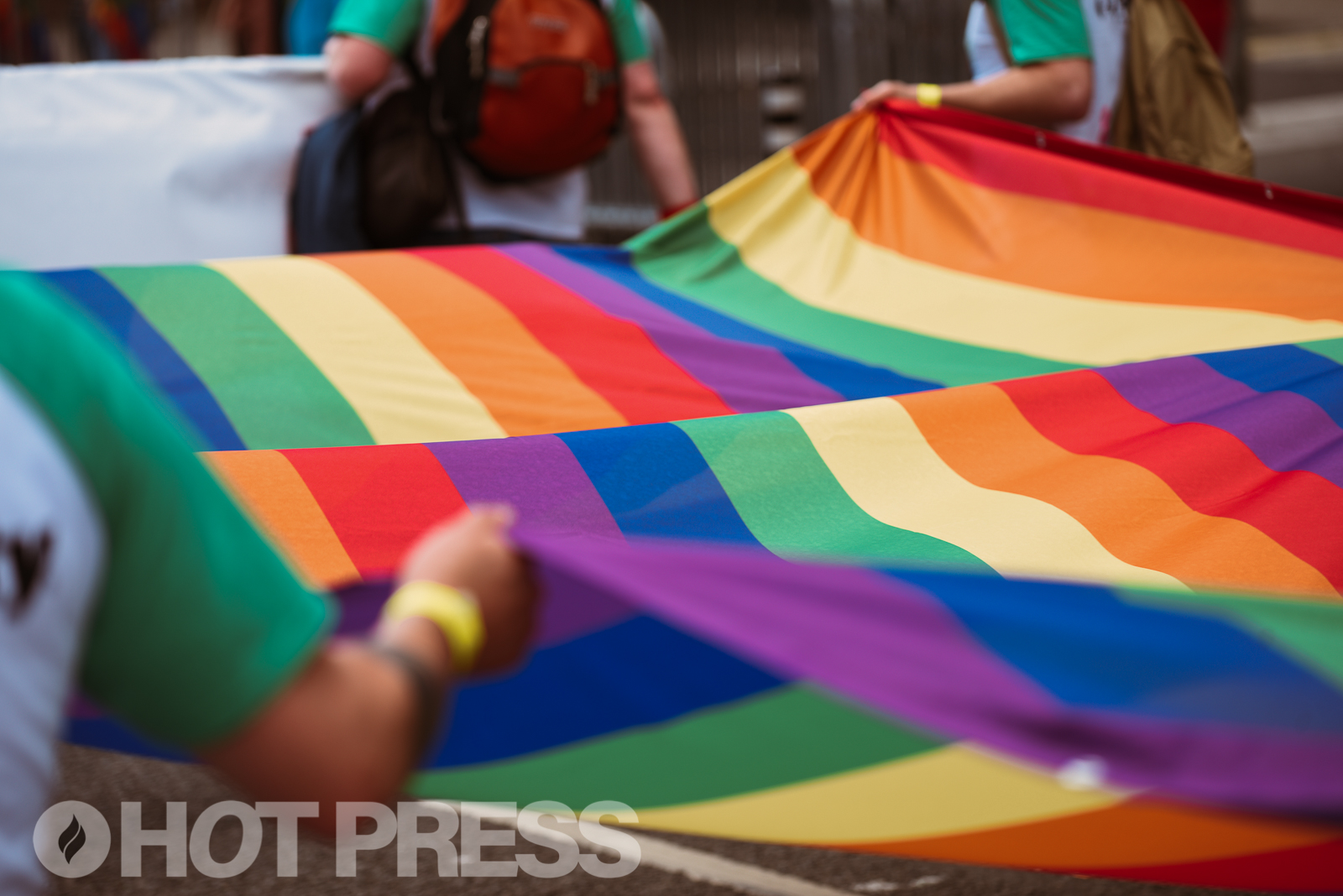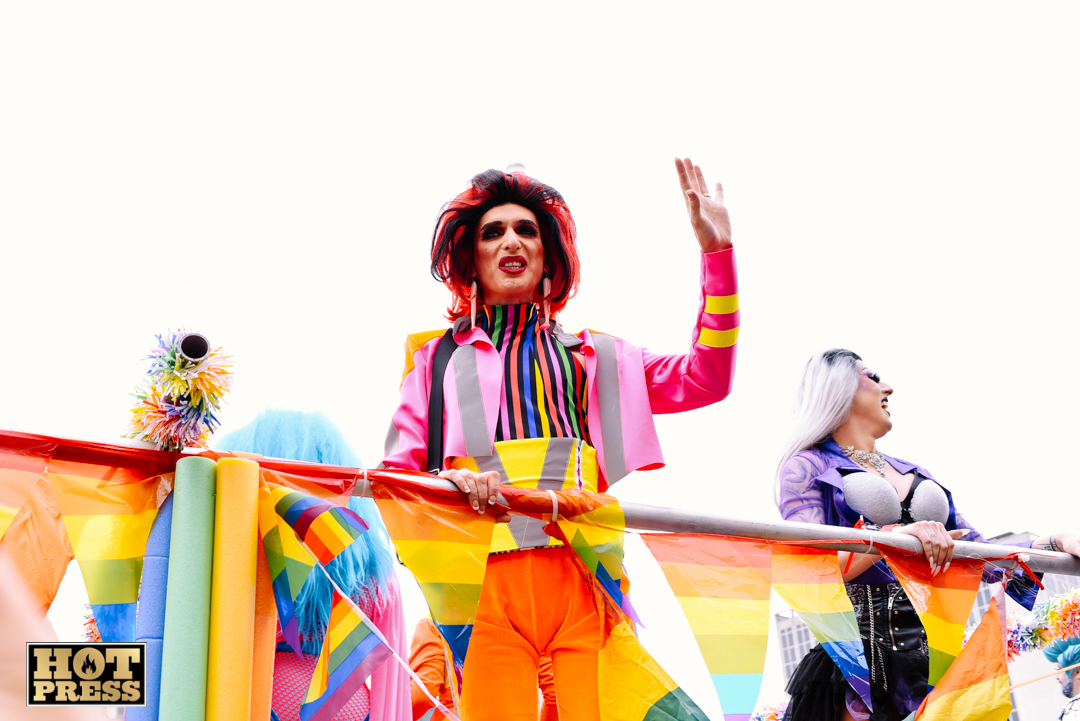- Opinion
- 23 Jun 23
Dermod Moore aka Bootboy: The Importance of Pride

As part of our Pride 2023 celebrations, we're looking back at a selection of classic features from the Hot Press archives. For nearly two decades, Bootboy, aka Dermod Moore, penned – "with punchy queer defiance" – a fortnightly column for Hot Press. In the piece below, originally published in 2010, he reflected on the important of Pride, in the aftermath of a controversial article by Sunday Times columnist Brenda Power...
Originally published in Hot Press in 2010...
The history of a community informs its values and norms. It is those values which Brenda Power, the Sunday Times columnist, was so forcefully critical of, in her blistering article against gay marriage last year. That criticism came under the spotlight again, recently, in Brian Finnegan’s forensic and passionate interview with her in the current Gay Community News. It makes fascinating reading.
In the interview, Brenda complained that she’s been on the receiving end a hate campaign since her original Sunday Times article. But, to me, it seems disingenuous to conclude that the vehemence directed against her is evidence of a community that feels “vindicated by victimhood”. Especially given that, when asked whether she has any understanding of the hurt that she caused with her article, she replied with the pithy single line: “What I said is the law of the land”.
Which of course is why the reaction to her views was, and is, so raw and pointed – by defending an unjust law, and the Catholic morality that underpins it, she became a lighting rod, attracting the ire of all those who find such theocratic notions obnoxious. A true believer will “go to the stake” for their beliefs, in classic martyr style, in a way that drives secular, rational, and otherwise sensible people crazy. And Brenda feels victimised now, which of course vindicates her argument.
That is not to say that there is no victimy stuff in gay people’s psyches – of course there is; Matt Lucas hilariously sends this up in his Only Gay In The Village spoof. One may dislike it intensely, and I do, but only because I am prone to it myself. All it takes is a cool, dispassionate, evidence-based examination of minority stress, and the effects of how a society treats minorities in its midst, to understand where it comes from.
There is no rational argument to be won with someone who is religious. That is the terrible reactionary premise of religion, one that lies behind blasphemy laws: articles of faith can’t be challenged or ridiculed or changed by reason or evidence. Until I was 30 years old, I was a criminal, subject to life imprisonment for my “crimes” – and it exasperates me when someone seems wilfully indifferent to the inevitable impact that such an experience has on a person. And on the issue of the Civil Partnership Bill, it seems to me an outrage that, in the 21st Century, we should enshrine inequality for gay people in our laws. Our experience of being declared sexual sinners and outlaws in such an irrational way for so long has left its mark. The hurt is very deep.
One experience seems to have coloured her views, apparently indelibly: she happened to watch a gay pride pass by when she was in town. She laments: “Every time you see people walking down the street with the arses hanging out of their trousers, wearing dog collars and being led along, first of all it alienates gay teenagers who think, ‘Is that what gay is? Is that who I’m meant to be?’ But also the whole point of it is that, if people see it and don’t like it, it allows you to turn around and shout ‘homophobe!’ It’s pointless and its silly.”

Dublin Pride. Copyright Miguel Ruiz.
It seems that overt displays of sexuality, when we party together, and the enjoyment we take in subverting gender roles, are what Brenda Power finds most troubling. Indeed, the sexualization of the gay community is something that we seem to take for granted. We have integrated it into our sense of ourselves, at least as evidenced by our publications and our Pride marches. In some ways, I think it is disingenuous of us to ignore the provocative aspects of public sex and fetishism and drag, when for so many queers, it is precisely because they know that they are giving the finger to traditional morals that gives such exhibitionism its frisson, its edge, its point.
And as for her interpretation of drag culture as misogynist, she fails to appreciate that being queer is not solely about who one decides to set up home with. It is also a profound statement on gender, on traditional concepts of masculinity and femininity. For many LGBT people, the binary of male/female is itself under scrutiny, and ripe for subversion and attack. This is, of course, deeply challenging to many people.
I often think that without lesbians and gays highlighting the shadows and contradictions of their opposite sexes, the level of awareness that men and women would have about each other would be far less acute. Most particularly, the perspective that a queer has about the opposite gender is often focussed on power, and how it is exercised.
Many gay men use drag to highlight the sexual and emotional strengths of women. Drag queens never model themselves on weak or ineffective women – in so many ways, a drag queen is declaring that the world is matriarchal; by donning a frock, she becomes, simultaneously, a walking critique and symbol of a kind of feminine, emotional, fierce power. It is precisely this sexual energy that makes many women uncomfortable, because men get so exercised and aroused by it, but it doesn’t make it any less real. At the opposite end of the scale, equally valid, there is the awareness brought by so many lesbians about the destructive power of men in a male-dominated society, which comes from a knowledge that the world is patriarchal. Both perspectives are valuable, and they do not cancel each other out.

Dublin Pride. Copyright Miguel Ruiz.
Brenda Power is right, in a way. In one version of a future society, based on true equality and integration, gay people would live their lives in exactly the same way as their heterosexual counterparts do. There would be no “difference” to mark or celebrate or protest about. We’d partner up and settle down, quietly. We’d grow out of fancy dress and nightclubs and the pub scene, at the same age as heterosexuals do. We’d live “ordinary” lives. It’s an essentially conservative view of life, and in many ways it’s got a lot going for it, in theory. The truth is that people generally don’t want to feel like outcasts or be stigmatized or marginalized.
However, something inevitably rears its head to complicate matters, in this Utopian vision of a fully integrated, homogenous society - one in which lesbian and gay people stay quiet and invisible and don’t feel the need to remind anyone else of their difference.
Sex.
As Tonie Walsh reminded me on his historical walk, to mark the George’s 25th anniversary, its first gay owner made his money in a gay sauna – a sex club. The sex industry, online and in establishments like gay saunas, funds many LGBT community endeavours, from Pride to Gay Community News, through advertising and sponsorship.
Sex is a powerful force, and in the gay community, many men in particular feel free to live quite anarchic sexual lives. Being Ireland, we tend to do it discreetly, online or in saunas, except at Pride, when we let it all hang out. It is therefore the open celebration of sexuality, not the assertion of pride in one’s orientation, that is at the heart of Brenda Power’s criticisms. And paradoxically, the one institution that has a time-honoured role in taming male sexual adventuring, the one thing in my mind that would go a long way to help change the way gay men relate to each other, less as sex objects, more as life partners, is the one thing to which she is implacably opposed.
It is, of course, gay marriage.
RELATED

- Opinion
- 04 Feb 11
Gubu Politics Haven't Changed Much At All

- Opinion
- 24 Jan 11
An Old Entertainer
RELATED

- Opinion
- 13 Dec 10
It's Only Money

- Opinion
- 29 Nov 10
Life And Death

- Opinion
- 03 Nov 10
No More Heroes

- Opinion
- 02 Nov 10
Time To Take The Poxy Medicine

- Opinion
- 01 Nov 10
Electric Picnic & Soul Poison

- Opinion
- 13 Oct 10


